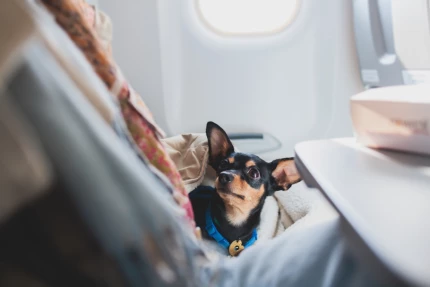Making Aliyah with pets
Moving to Israel is an exciting and life-changing experience, but for pet owners, it comes with an extra layer of planning. Bringing your furry companion along on your Aliyah journey requires careful preparation to ensure their safety, comfort, and compliance with Israeli regulations. From vaccinations and import permits to travel arrangements and settling into a new environment, this guide will help you navigate the process and make the transition as smooth as possible for both you and your pet.
an Israeli citizenship specialist
Current restrictions
To enter the country with animals, there are definite regulations and restraints that must be observed. Here are the main points to note:
Your pet must be over a definite age to be imported. This is usually at least 3 months of age for canines and felines.
Pre-Flight preparations
The vet should also issue a health testimonial, which may be required by the airline and customs authorities of the destination. In some cases, additional immunisations or parasite treatment may be required. Choosing the right container to convey the animal is critical. The container must meet IATA standards, which include demands for size, ventilation, strength and security. The container must be large enough for the animal to stand, turn and lie down in a natural posture. The inside of the container should be padded to keep the pet comfortable. It is also advisable that identification tags with the owner’s contact information be attached to the container.
The pet should be accustomed to the container before the voyage. This will help reduce stress and anxiety during the voyage. It is advisable that the container be left open in the house so that the pet can explore and get used to it. You can also place your pet’s favourite toys or blankets in the container to create a familiar and calming environment.
Traveling with pets
It is vital to properly ready your domestic beast for the voyage in terms of nutrition and hydration. A few hours before the voyage, it is advisable that feeding and drinking be restricted to avoid indigestion or the need to toilet during the voyage. However, the domestic beast should have access to water in a container to avoid dehydration.
After arriving at the destination, it is vital to pick up the domestic beast as soon as possible and check on its condition. The domestic beast may be disorientated and stressed, so it is vital to provide a calm and comfortable environment for the domestic beast to recover.
Requirements and certification
The first step is to receive a vet testimonial. The animal must be examined by a vet who will confirm that it is healthy and free of contagious diseases. The testimonial must be issued no earlier than 10 days before entering Israel. The testimonial must include all essential details about the beast, including its age, breed, sex, identification tags (e.g. microchip) and immunisation information.
In some cases, additional certification such as a testimonial of parasite treatment may be required. This is particularly vital for coming from countries with a high risk of disease. The vet must certify that the beast has received the essential treatment and does not pose a health risk to other beasts or humans.
In addition, beast owners should be prepared that there may be additional costs associated with importing the beast. These may include customs duties, vet inspection fees and other administrative costs. It is advisable to clarify all possible costs in advance and ready the essential funds.
FAQ
Rabies immunisation is required when importing canines and felines into Israel. The vaccine must be given at least 21 days prior to arrival. It is also advisable to check that the beast is vaccinated against other diseases such as leptospirosis and parvoviruses, although this is not mandatory.
Yes, before travelling, your beast must be examined by a vet who will issue a health testimonial.
Every beast must be identified with a microchip that complies with international standards ISO 11784/11785. If your beast does not already have a microchip, you should have it fitted prior to rabies immunisation.
Before coming to country, you must receive an import permit from the Israeli Ministry of Agriculture. To do this, you need to fill out an application form and provide all the essential documents such as a health testimonial, vaccine record and microchip information. The process usually takes several weeks, so it is advisable to do this in advance.
an Israeli citizenship specialist
